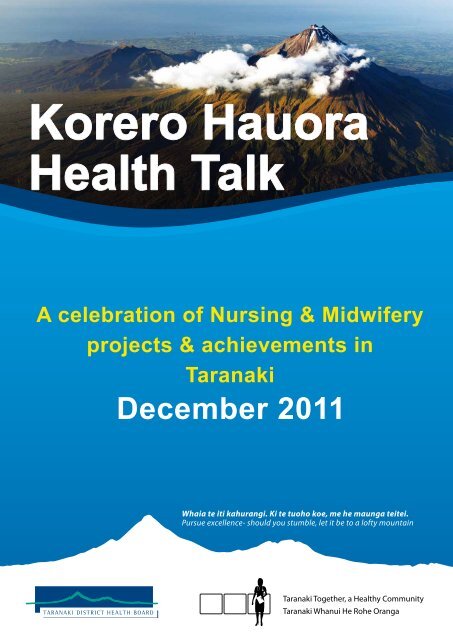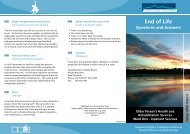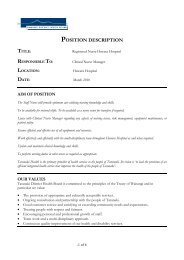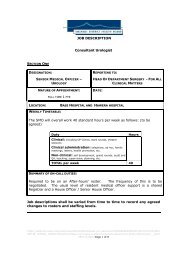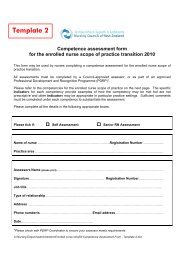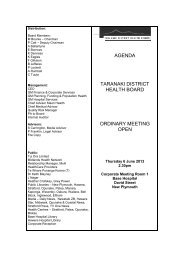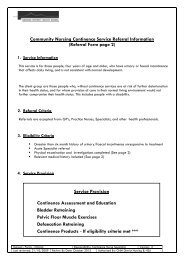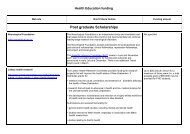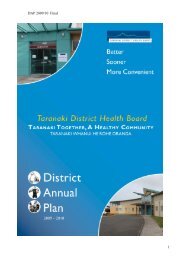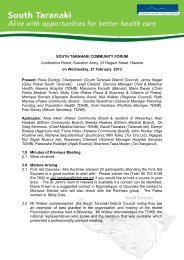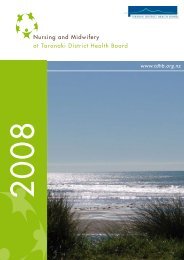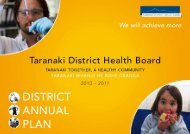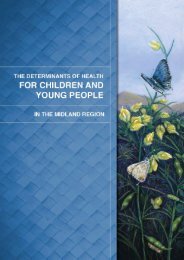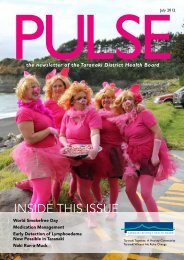Korero Hauora Health Talk - Taranaki District Health Board
Korero Hauora Health Talk - Taranaki District Health Board
Korero Hauora Health Talk - Taranaki District Health Board
You also want an ePaper? Increase the reach of your titles
YUMPU automatically turns print PDFs into web optimized ePapers that Google loves.
<strong>Korero</strong> <strong>Hauora</strong><strong>Health</strong> <strong>Talk</strong>A celebration of Nursing & Midwiferyprojects & achievements in<strong>Taranaki</strong>December 2011Whaia te iti kahurangi. Ki te tuoho koe, me he maunga teitei.Pursue excellence- should you stumble, let it be to a lofty mountain<strong>Taranaki</strong> Together, a <strong>Health</strong>y Community<strong>Taranaki</strong> Whanui He Rohe Oranga
C O N T E N T SINTRODUCTION 3FAREWELL TO A NURSING STALWART 4RECOGNITION OF A NURSING PIONEER 9POSTGRADUATE STUDIES, PROJECTS AND INITIATIVES 10Supporting Post Graduate Education and Development in Nursing and Midwifery 12Post Graduate Study Leads to Nurse Led Eczema Clinic 13Advancing Clinical Practice 14Fostering a Love for Learning 15Clinical Practice Development Flourishes in Emergency Management 16Shifting Clinical Practice and Critical Thinking in Mental <strong>Health</strong> Nursing 17Clinical Practice Continues to Develop in Aged & Residential Care Nursing 18Post Graduate Study Has Helped My Clinical Practice an Critical Thinking Develop 19Leadership and Compassion in the Theatre Setting 20Thoughts on Attaining my Post Graduate Diploma in <strong>Health</strong> Science 22Knowledge Acquisition in Post Graduate Course Leads to Insight into <strong>District</strong> Nursing Service 23Risky Crossings 24Specialist Clinical Nurse - Exercise Tolerance Testing and Pre Assessment Clinic 26Nurse Practitioner - Heart Failure 27Becoming a Midwife in <strong>Taranaki</strong> 28Post Graduate Complex Maternity Care Course Helps Develop Clinical Practice 29Baby Friendly Hospital Initiative (BFHI) 30How Post Graduate Study Has Influenced My Clinical Practice Development 31A TIME TO CELEBRATE OUR PROFESSIONS 32International Nurses and Midwifery Days 2011 32Compilation of PDRP Portfolio - A Nurses Journey 33TDHB Professional Development and Recognition Programme/Quality Leadership Programme 34Primary/Secondary Partnership Approach to Professional Development 35TIME TO CARE 36ONGOING INITIATIVES 382011 <strong>Korero</strong> <strong>Hauora</strong> - <strong>Health</strong> <strong>Talk</strong>2
We Bid Farewell to a Nursing Stalwart -Alison BrownAlison Brown has seen many changes in her thirty seven year time span of unbrokenservice with <strong>Taranaki</strong> <strong>District</strong> <strong>Health</strong> <strong>Board</strong>. During these periods of change staffworking within organisations such as hospitals, rely on solid dependable no-nonsenseworkers to facilitate and anchor change. Alison is certainly worthy of note in thiscapacity as an enthusiastic and tireless worker.Alison started off her career as a hospital aide thirty seven years ago in Ward 4,followed by working on general pool. In 1987 Alison undertook her Enrolled Nursingtraining, followed by a stint in Barrett Street Hospital prior to joining the Maternal-Child Pool working in Ward 2, NNU, Maternity Unit and the Tabor Unit laying thefoundation for a broad clinical experience base.In 1994 Alison commenced a permanent position in Ward 2 as an Enrolled Nurse andtwo years later transitioned to become a Registered Nurse. It is here in Ward 2 whereAlison has enjoyed the last 17 years of her working life. Not only has she supportedparents and families through the trials and tears associated with sick children but alsohas been a strong supporter of all her nursing colleagues. Alison managed to juggleshift work with the demands of a young family as well as being there for her peerswhenever she was needed. Her own personal philosophy of “just get on with it”,provided everyone with a shining example of how things should be done!There have been many highlights in Alison’s career span, one which readily springsto Alison’s mind is the fact she started as a hospital aide and progressed to EnrolledNurse and later to become a Registered Nurse. Alison gratefully acknowledges thehelp <strong>Taranaki</strong> DHB provided in order to support her career advancement.In fact, Alison was a key driver in setting up the successful Enrolled Nurse toRegistered Nurse transition programme where nurses could work and study with thejoint support of <strong>Taranaki</strong> DHB and Western Institute of Technology (WITT).Some of the changes Alison has seen over the years in child health included theimplementation of the paediatric assessment unit, working collaboratively with thetertiary centres such as Starship Hospital for complex cases. Inter organisational caseliaison occurs almost on a daily basis. This approach utilises specialist services for bestpractice and improved child health outcomes.A significant component of Alison’s career has been her long standing andextraordinarily dedicated involvement and service with the New Zealand NursesOrganisation (NZNO) as an active delegate, strong advocate and site Convenor fornursing issues. Integral to this was Alison’s contribution, at national and regionallevel, with contract negotiations, chairperson duties, <strong>Board</strong> proxy and an ever presentdesire to support colleagues when needed. This involvement led to NZNO HonoraryMembership in 2010. Alison holds a great deal of respect from nurses, other clinicalcolleagues and from all levels of management within the organisation.2011 <strong>Korero</strong> <strong>Hauora</strong> - <strong>Health</strong> <strong>Talk</strong>
The Human Resources (HR) team would like to convey their warmest wishes toAlison. “In all our time when dealing with Alison, we have found her to be a verypragmatic and level-headed person; enabling professional, but yet robust, discussion.Her enthusiasm and commitment when advocating for NZNO members and her nursingprofession has been outstanding. We will certainly miss her dry sense of humour, butwe wish her all the very best in her next endeavours. All the best, the HR Team at TDHB”.So just what has kept Alison’s passion for healthcare and child health?Paediatrician and colleague Dr John Doran captures what is well known about Alison:“ ‘ Grandma’ is a title that totally reflects the esteemed place Alison holds in ourdepartment. Setting an example- from her nursing and life experiences, being thereto support all her colleagues young and old; prepared to make things happen andproviding a shoulder to lean on and an ear to listen, all of these are part of what Alisonhas been for us. We know she will always be there as a friend and continue to advocatefor children wherever she is”.Other colleagues describe Alison as a caring, committed, forthright, compassionateteam player, always seeing the current project through to completion with her valuablecontribution.Thoughts for the future as Alison nears her retirement date include looking forward tospending more time with her eight grandchildren, some more travelling and gardening.We leave the last word to Alison “It will be hard to retire as so many of my colleagueshave become great friends over the years. I will miss you all”.From all of us at TDHB thank you for your wonderful service over the last thirty sevenyears Alison, and every best wish for a long, happy, busy, relaxing, enjoyable retirement.You certainly deserve it!
Lara Puketapu-Collins, Ward 1, in our newlook uniform. This photo is destined tofeature in our Inpatient Ward Brochures.2011 <strong>Korero</strong> <strong>Hauora</strong> - <strong>Health</strong> <strong>Talk</strong>
Supporting Post Graduate Education andDevelopment in Nursing and Midwifery PracticeIn 2010 an expression of interest was put forward by nurses in Hawera Hospital to‘design a post graduate rural paper for nurses working in Hawera’. This was theinception of the development of a post graduate course to be known as N714/758Nursing Practicum/Advancing Clinical Expertise in Nursing planned to be delivered insemester two 2011 in <strong>Taranaki</strong>.During the second half of 2011 a group of Registered Nurses from various clinicalsettings embarked upon this 30 point course, full of anticipation, trepidation,excitement and inspiration. Post graduate writing and language is like silken honeyto some and as foreign as Mars and Jupiter to others. Critical thinking and criticalanalysis and reflection were soon to become part of everyday language!An ever present ‘patient-centred care approach’ was crucial to the course.Despite the differing learning styles, clinical backgrounds and stages of post graduatestudy, the group launched onto the course inspired by their lecturer from theUniversity- Mia Carroll, and supported by clinical and academic mentors and coachesfrom within <strong>Taranaki</strong>.To achieve quality clinical initiatives and projects, as part of an assignment in thecourse, the nurses selected some wonderful assignment topics and ongoing clinicalprojects, which has led directly to changes in clinical practice development. Someof these projects and/or resulting initiatives and innovations are showcased in thisedition of <strong>Korero</strong> <strong>Hauora</strong>. Congratulations to all N714/758 students, and gratefulthanks to contributors for sharing their professional stories.“It is the individual patient who we treat, not the disease.It is the patient who recovers or dies, not the illness”- James Peck, MD, Am. Jour. Surg. 2004.2011 <strong>Korero</strong> <strong>Hauora</strong> - <strong>Health</strong> <strong>Talk</strong>12
Post Graduate Study Leads to Nurse Led EczemaClinicBy Brenda Sturgeon, RN, PGCertHSc, Paediatric Community Nurse, South <strong>Taranaki</strong>.If anyone mentionedpostgraduate studies to me fiveyears ago I would have laughedand said “no way”.Now that I’ve almostcompleted my Post GraduateDiploma, I am looking at morestudies next year. Believeme it has not been an easyroad. It requires considerablecommitment in terms of time,balance to personal, busy fulltimeclinical employment andacademic endeavours.When I completed my hospitalbased nursing training thirtyfive plus years ago I neverthought I would go back tosuch complex study again.However, I have and I don’tregret one minute of it. It haschanged my way of thinkingand direction. I have developeda much increased knowledgebase accompanied by complexdecision making skills that arealways evidence based.Within my current role I haverecognised a gap in servicedelivery in one of the areasof my work. Post graduatecourses and papers havemade me more responsiveto health needs and I havebecome empowered toinitiate, lead and manage aservice development in nurseled eczema/skin clinics in South<strong>Taranaki</strong>.Brenda with one of her patients in clinic.The Advanced Assessmentand Clinical Reasoning courseis one of the amazing papersI have undertaken and thishas led to an advancementof my nursing practice. Thehigh degree of knowledge,skill and expertise associatedwith the paper has helpedme to progress this nurse ledproject striving for improvedpatient and service outcomes.Every patient is unique andI now see my patients ina more holistic way and incollaboration with colleagues,including our paediatricianDr John Doran, I believethe patient outcome will bebetter achieved. I have to sayI am excited about driving thisproject forward.There is an enormous senseof personal satisfaction andachievement in commencingand completing postgraduate papers, there willalways be challenges alongthe way but right now I havea desire and aptitude forlearning and if that means Ican improve my healthcarepractice and ultimatelypatient care then I will haveachieved what I set out todo. It hasn’t always been asmooth road, but if you’repassionate about your workthe way I am it is definitely aroad worth travelling.132011 <strong>Korero</strong> <strong>Hauora</strong> - <strong>Health</strong> <strong>Talk</strong>
Fostering a love for learning- Post Graduate Study andClinical PracticeBy Jill Barron RN, PGDip HScJill Barron, Nurse Educator (ED Base)triages tamariki in ED.I had just had a most horrendous shift working at triage in Emergency Department(ED), with unrelenting ambulances bringing us patients, as well as walk-ins by thedozen. I felt I needed more skills to prevent missing someone really sick, and illequipped to cope with such an influx of numbers. Thoughts of the patient who died inthe Christchurch ED waiting room began to surface.This began my journey in to the world of post graduate study in 2008. With my familygrowing up the timing seemed right. Fortunately the Advanced Assessment andClinical Reasoning paper which I really wanted to do was being provided in <strong>Taranaki</strong>,so I duly signed up, and ended up with Biological Science for Practice as well.It was, I felt, a bold move on my part. The last real study had been in the UnitedKingdom (back in the 1980’s!!) when I sat my state finals and religiously transcribed theinformation we had been taught with out a care of referencing in the world.Postgraduate study was quite a bit different. New terminology and concepts, differentteaching styles, Boolean searches, research articles, libraries and journals I never knewexisted!From my meagre beginnings in the world of academia I think I have come a long way,and slowly have found my way round academic writing and APA referencing. I can stillremember the whole Sunday it took to complete the reference list for that first paper.I have thoroughly enjoyed all the papers I have undertaken, and feel that my practicehas improved, and my level of understanding has been raised. Whether I am workingon the floor or orientating staff, I have different teaching styles to fit individual learningstyles, and knowledge of techniques for assessment, and knowledge to differentiatenormal from abnormal.I am now working as the ED Nurse Educator, following on from a Clinical NurseSpecialist (CNS) role in pre admissions. These jobs I could only dream of doing andbeing effective in prior to my study, and am lucky to be working in a job and area Ilove.There were some sacrifices to finish assignments on time. The garden has suffered,plenty of one pot wonder dinners (I think I have put the kids off crock pots for life),housework left, and having to put off invitations to get the study completed. But I ampretty sure I will receive my Post Graduate Diploma this year, and am very proud!!!I would like to thank my family who have supported me through the study, despitethe impact on them. There is also tremendous support within the hospital for thoseundertaking papers which has been terrific.I would encourage anyone thinking of study to go ahead and take the plunge. If I canget through learning the academic writing style required and referencing, then so cananyone! It has fostered my love of learning, and with our always evolving profession, Ifeel better equipped to meet that head on. 152011 <strong>Korero</strong> <strong>Hauora</strong> - <strong>Health</strong> <strong>Talk</strong>
Clinical practice developmentflourishes in EmergencyDepartment“My Journey Through Postgraduate Study” By JackieFlynn (ED Base) final paper for PGDip HSc - enough tomake you smile!In 2006 I was encouragedto undertake postgraduatestudy. I thought about itfor about three years andin 2009 I started my firsttwo papers. These werethe Biological Science forPractice paper, (which was 15points at the time), and theAdvanced Assessment andClinical Reasoning Paper. Itwas a good time for me tostart studying, as my childrenwere growing up and leavinghome. I felt I would have thetime I needed to put intostudy. Luckily one was stillat home and could teachme how to do things on thecomputer! Now in 2011 I amalmost finished my last paperto complete a PostgraduateDiploma in <strong>Health</strong> Sciences.I have found postgraduatestudy a bit of a bumpy ride attimes, and a lot of work, butthe sense of achievementand the rewards far outweighthe ups and downs. Postgraduate study has taughtme the art of criticalthinking, and to analyse mynursing practice. I now trynot to jump to preliminaryconclusions, but to apply mycritical thinking to considerpossible diagnoses. Postgraduate study has givenme much more confidencein patient assessmentand an understanding ofclinical analysis, diagnosticreasoning and researchbased practice. This hasimproved my ability todiscuss the presentationof my patients with thewider health team includingdoctors. I have also greatlyimproved my computer skills.This semester I have beendoing the Nursing Practicum/ Advancing ClinicalExpertise in Nursing paperwhich I have enjoyed. Thelearning in this paper hassupported me to take ona role in a project for theEmergency Department (ED).We are currently developingthe Fractured Neck ofFemur Pathway, and I willbe involved in introducingthis pathway in ED. <strong>Talk</strong>ingto the staff, auditing (oncethe pathway is in place), andaccepting discussion andongoing feedback from thestaff to establish whetherthere is improvement in thepatient process through ED.I have an interest inOrthopaedics and Trauma,nurtured by previousorthopaedic trainingoverseas, my role as plasternurse and emergencynursing clinical experience. Iwanted to do something that2011 <strong>Korero</strong> <strong>Hauora</strong> - <strong>Health</strong> <strong>Talk</strong>Above: Jackie Flynn assesses ‘patientDebbie Campbell’ for shortening insuspected ‘fractured neck of femur’.would benefit ED and ourpatients.I feel I was able to extendmy practice developmentto take on new learningexperiences in my clinicalsetting.Thank-you to all of thosewho helped me and gave mesupport along the way. ChrisGruys our post graduatecoordinator, University ofAuckland lecturers, andvarious 0800 helpline staff,University of Auckland librarystaff, TDHB library staff,various study buddies, thissemester my clinical mentorCam Grant-Fargie and a verylong suffering daughter. It ismuch appreciated! Oh, andlast but not least the <strong>Health</strong>Workforce New Zealand(HWNZ) Fund.16
Shifting Clinical Practice and Critical Thinkingin Mental <strong>Health</strong> NursingBy Donna Gush, RN, PGCertHScHi, my name is Donna and I work in Acute Mental <strong>Health</strong>.Sometimes that is greeted with a certain amount ofpreconceived ideas and stigma… Mental <strong>Health</strong> Nurses aren’t“real nurses”, “what’s wrong with you that you want to workthere?”, and the old jokes about you can’t tell the nurses fromthe patients.Well, nursing in mental health is a highly skilled specialisedfield, and doing post graduate study has helped me to bothwork more effectively and to value what I and those I work withdo. We make a difference to people in distress – and isn’t thatwhat nursing is about?While I was working on my most recent assignment I found a quote which mademe stop and think about what it is we do: “Inpatient psychiatric nursing requiresconsiderable expertise in assessment and treatment of severe forms of psychiatricillness, with psychodiagnostic and psychopharmacological skills, psychotherapeuticinsights, knowledge of group and family dynamics, psychosocial and culturalawareness and an ability to relate to other professionals and relevant outsideagencies. And this list is not exhaustive” (Leonard Fagin, Psychiatrist).I returned to study after a lengthy break (about fifteen years) and had some anxietyabout whether I could still study. I can. I also started working in Mental <strong>Health</strong>sometime after I did my nursing training and there had been a few changes. Focus ofcare to a recovery model with management of mental health clients in the communityas much as possible – the main role of Acute Inpatient Care was now to stabilisepeople in as short as possible time so people can be returned to community care,meaning that often people in Inpatient Units are more unwell than they were in thepast (as they remain in the community longer). As someone said clients are oftendischarged at a level that ten years ago they would have been admitted at … also,since I had last had any contact with mental health nursing the “big bins” had closedand those who would have been sent to them for treatment are now nursed here. TheMental <strong>Health</strong> Act had been updated and was quite different from what I had learnt. Itwas a different world.There is a lot of training provided through the hospital for those who work in mentalhealth, but after a while I wanted to learn more than was offered, to augment it.Post graduate study has helped me to feel more confident about things such asmental health assessments, working with patients to help them understand the linkbetween their thinking and behaviour, recommended approaches towards peoplewho self-harm and to challenge in myself why I do things the way I do – is my practiceactually the best for benefiting that patient? There is much more. It has been said thatInpatient Mental <strong>Health</strong> nurses are poor at articulating what they actually do – I feel Ihave barely skimmed over what I have learnt and gained, and I believe my practice isnow at a higher level due to what I have learnt.So, if you’re on the edge of deciding and not sure – I encourage you to go for it, you’llbe challenged and grow in skills and confidence… one assignment at a time.172011 <strong>Korero</strong> <strong>Hauora</strong> - <strong>Health</strong> <strong>Talk</strong>
Clinical Practice continues to develop in Aged & Residential CareNursing By Bronwen Pepperell, RN. on final pathway to Masters of Nursing 2011,NurseConsultant Aged CareThe Nurse Consultant AgedCare role was implementedin 2007 to support ongoingprofessional educationand development for theresidential aged sector in<strong>Taranaki</strong>.Key areas of work for thisrole include facilitatingclinical education days forRegistered and EnrolledNurses (RN) (EN)s from thissector. For example, in 2011,a clinical refresher study dayhas been held with a varietyof relevant clinical topics.Access to <strong>Taranaki</strong> DHB studydays continues and nursesfrom this sector have beenable to attend many differentstudy days, for example,wound, respiratory, mentalhealth, and pharmacology.Uptake of ProfessionalDevelopment RecognitionProgramme (PDRP) inthe sector continues tobe popular with nineteenfacilities participating in theprogramme. Many ENs inthis sector have transitionedto the new EN scope ofpractice by completing theirportfolio and meeting thenew competencies.The Aged Care ClinicalEducation and Leadership(ACCEL) programmehas been developed inconjunction with Dr MichalBoyd, (Gerontology NursePractitioner and SeniorResearch Fellow, Auckland),and delivered in <strong>Taranaki</strong>.Fifteen RNs from residentialaged care participatedin this programme whichfocused on advanced clinicalskill development. Nursesensitive quality indicatorswere collected prior tothe programme andagain following ACCEL.There were significantimprovements noted incompleted skin, falls andnutrition risk assessmentundertaken by the RN.In addition presence ofskin breakdown was alsorecorded with resultsindicating decreases innumbers of skin tears, lowerlimb ulcers and pressureinjuries. Further ACCELprogrammes are planned for2012.An example of clinicalpractice development andquality improvement initiativeis highlighted by Dr Boyddescribing Albert Lim whoworks in the sector: “I hadthe pleasure of teachingAlbert as part of the ACCELprogramme through <strong>Taranaki</strong>DHB. Albert was a joy towork with and he is clearlypassionate about being anurse and about.He significantly developedhis physical assessmentskills with mentorship byBronwen Pepperell. He alsomade an impact throughthe implementation of astandardised handoversystem in his aged carefacility. He collaborated withthe GP and staff to adapt it tothis environment. He reportsthat the GP was very happywith the tool and found itvery helpful for reporting ofresident issues.I was also very impressed thatAlbert has used the researchliterature to inform and shapehis clinical practice. He hasshared this literature with hisnursing colleagues and withthe GPs he works with. Hehas demonstrated excellentinitiative to improve practice.Albert is a shining exampleof how upskilling nurses inaged care can translate intochanged practice”.Concurrent to the ACCELprogramme, Albert hassuccessfully completed twopost graduate papers thisyear as well.Albert, Michal and Bronwen and‘hand held friends’ mourn therecent loss of Steve Jobs providingexcellent care for older people inresidential aged care.2011 <strong>Korero</strong> <strong>Hauora</strong> - <strong>Health</strong> <strong>Talk</strong>
Post Grad Study has Helped My ClinicalPractice and Critical Thinking DevelopN714/758 Nursing Practicum/Developing Clinical Expertise in Nursing.By Pauline Matuku, RN/Facility Manager-Aged Care SectorThis paper (N714/758 Nursing Practicum/Advancing Clinical expertise in Nursing) hasbeen a great enabler in advancing my clinical practice. It has challenged my thinkingaround every day clinical care and taught me how to critique and question what sitsbehind the care we provide and how we deliver it. This has resulted in a huge shift inpractice for myself, of which has filtered down to staff at the facility that I manage.I have developed many new skills and I can honestly say I am using every one of themon a day to day basis. I am now able to search, research, critique literature, utiliserobust evidence and apply it into my practice, and provide education to my staff.New learning has given me a confidence that I never had before. It has allowed me tomove forward and take control of my own practice and the every day practices of thefacility I manage, make changes knowing that I have sound rationale for the same, andthis all works to provide good patient resident care.I have also developed a network with people, something that I never had before.Managing an aged care facility can mean working in isolation a lot of the time,a situation which can be quite lonely. I now have good support and people thatI can resource when I need to. Learning from this paper has also improved mycommunication skills with those people I work closely with. I attribute this to thedevelopment of my own knowledge base, which has enlightened and empowered meand given me confidence.I would like to thank <strong>Taranaki</strong> <strong>District</strong> <strong>Health</strong> <strong>Board</strong> (TDHB) for access to ‘my beautifulmentor’ Suzanne Smith. Sue has been a great but hard mentor. Not only did shementor me but she supported me how to learn, research, and produce academicwork. I would recommend her to anyone.“ It has challenged mythinking around every dayclinical care and taughtme how to critique andquestion what sits behindthe care we provide andhow we deliver it”2011 <strong>Korero</strong> <strong>Hauora</strong> - <strong>Health</strong> <strong>Talk</strong>
Leadership and Compassion in the TheatreSettingBy Tania Russell RN, PGCert HSc.In semester two I undertook the Nursing Practicum/Advancing Clicical Expertisein Nursing post graduate course. As part of one of the assignments we were todemonstrate leadership in our role, with a person/patient/family centred approach. Ichose leadership and compassion in the theatre setting.When developing this leadership objective I initially struggled to identify areas ofleadership in my practice but as I have reflected over the course of this assignmentI have identified that I am a leader in everyday practice, in my Recovery (PACU) bedspace, in my work environment, in my communication with others and in advocatingchange.Working in the perioperative environment does not lend itself well to family centredcare. Traditionally theatre and the post anaesthetic care unit(PACU) have not beena place for parents or family members to have access while their loved ones arechecked in for surgical procedures in the preoperative unit or while recovering froman anaesthetic. PACU is a small compact area which does not enable effective patientprivacy. While attempts are made by staff to ensure privacy while maintaining dignity,it is difficult when family members are present due to the nature of the recoveryexperience of each patient, high acuity, lack of space as well as high patient volume.(Smykowski & Rodrigues, 2003).Compassion in care is an area often neglected in the PACU/theatre phase. Spendingtime with a patient pre operatively who is anxious is something poorly managed dueto lack of time, the arrival of post-operative patients in the recovery unit, and with lackof staffing also a barrier, Murray cited in Kai Tiaki Nursing New Zealand (2011) that“operation time is a valuable commodity and resource that is expensive and limitedwhere time can be a source of tension as individuals; compete for control to use it.”As patients arrive in the post-operative unit they are sometimes not suitably covered,with surgical appliances for example, drains sometimes coiled around limbs. This sortof thing happens for various reasons, including the medicated sedated state of thepatient following surgery.Through the ability to lead and manage change in my work environment I haveinitiated and introduced changes in practice, by being a voice for the unconsciouspatient.I have done this by speaking at staff meetings advocating change in the way werecover children, talking about patient centred care and how patients have a right todignity and privacy. I have spoken to Clinical Nurse Leaders and the multidisciplinaryteam about how we can improve on the process we transfer patients with increaseddignity.As this course has required robust referencing, I align the quality improvement withthe Nursing Councils Code of Conduct which all Registered Nurses in New Zealandoperate by. (NZNC, 2009)202011 <strong>Korero</strong> <strong>Hauora</strong> - <strong>Health</strong> <strong>Talk</strong>
Another area where leadership and change has been implemented is in the way wenow recover children. There was a time where parents were able to come to recoveryonce their child was ready for discharge back to the ward. Children often cry and aregenerally unsettled post operatively, waking in a foreign environment can at timesexacerbate their disorientation and I felt that having a parent present could alleviatesome of their anxiety if they were present well before the point of transfer. Leading byexample I began to arrange for parents to be present sooner and it was evident thatthis showed a positive effect on the child. With young children and babies I encouragethe parent to sit or lie on the bed with their child.As part of any change, the new practice resulted in identification of some logisticalbarriers, for example in the actual mechanics of the transfer process. Timmins (2008)conceded regardless of the nature and the size of change it must be accepted thatresistance to change is a common human attribute. Allowing time to adjust to thispractice is still underway in recovery, there has been a positive change to the way Irecover children which has been beneficial to both my practice and the experience ofthe patients. Communication is a competency for critical care nurses both written andverbal (NZNO,2002) and is a skill necessary to communicate across all levels of thehealth care continuum resulting in patient centred care and a positive experience forthe patients and families we deal with.The recovery room provides a safe place for patients to recover from the effects ofanaesthetics and surgery whilst being cared for by a health professional whose rolestands to identify, assess and correct potential or real immediate post operativecomplications. With continual assessment and reflection of my nursing practice inpatient centred care and safety, I am able to influence positive change and facilitatea positive patient recovery experience. Communication is very important to allow themechanism to collaboratively provide continuity of care for the patients we all workwith.Compassion is a valuable component to care that has motivated my nursing practicewith a positive effect on patients which results in a positive outcome of care.ReferencesMurray, N. (2011). Nurses Challenge Operating Room Culture. Kia Tiaki New Zealand,17(7), 20-21.Nursing Council of New Zealand: (2007). Competencies for registered nurses.Wellington, New Zealand: Author.New Zealand Nurses Organisation. (2009). New Zealand Organisation Submissions:Review of RN Scope of Practice. Wellington, New Zealand: Author.Smykowski, L. Rodriguez, W. (2003). The Post Anaesthesia Care Unit Experince: Afamily Centred Approach. 18(1) 5-15.Timmins, F (2008). Communication Skills: challenges encountered. Nurse Prescribing,6 (1), 11-14.212011 <strong>Korero</strong> <strong>Hauora</strong> - <strong>Health</strong> <strong>Talk</strong>
Thoughts on Attaining my Post Graduate Diploma in<strong>Health</strong> ScienceBy Claire Barrett, RN, Rural <strong>District</strong> NursePost graduate study has been both rewarding and challenging. The most rewardingaspect of studying has been seeing how my learning has impacted on my practice.As a rural <strong>District</strong> Nurse, I feel more confident in working collaboratively with patientsand their families/whanau, and being more aware of recommended best practice alsogives me confidence in looking at treatment and management options for patients. Iam more confident in discussing cases with other health professionals, and referringpatients to other health providers. These factors all combine to make my job a lotmore satisfying and rewarding.I really valued the time spent with other nurses who were studying alongside me.We supported and encouraged each other, and this mutual acknowledgement andunderstanding of what we were working through, was very helpful. The support fromlecturers, mentors and other senior nursing staff was also appreciated. They were verygenerous of their time and professional sharing.Studying and working and trying to have a life was very challenging, as I spent a lotof time reading and thinking. However I am grateful for the opportunity to advancemy nursing practice and be able to offer a better level of service to my patients, andhopefully encourage and support my colleagues.“ I really valued the time spentwith other nurses who werestudying alongside me.”222011 <strong>Korero</strong> <strong>Hauora</strong> - <strong>Health</strong> <strong>Talk</strong>
Knowledge Acquisition in Post Graduate CourseLeads to Insight into <strong>District</strong> Nursing ServiceBy Patrick Morris, RMN, RGN, PGCert Clin Sup.It has been my privilege to have completed two post graduate leadership papersN732 Nursing Leadership Practicum and N775 Leadership and Management of Quality<strong>Health</strong>care this year. I would recommend this Post Graduate Cerificate (PGCert) andUniversity of Auckland wholeheartedly to any nurses interested in acquiring a greatnew set of skills and knowledge.The first paper was delivered here at <strong>Taranaki</strong> Base Hospital and the second at Albanycampus of University of Auckland .The format for both papers included two individual written assignments, a thirdgroup written assignment plus a group presentation. The group assignment involvedformulating and facilitating a Quality Improvement (QI) across the two semesters. Areflective journal/diary was another component common to both semesters.Highlights for me were:• Reflection and acquisition of knowledge - which is always interesting.• Appreciative Inquiry as a model of change/leadership approach (Coghlan, A. T.,Preskill, H., & Tzavaras Catsambas, T. 2003).• Lean Thinking (http://www.institute.nhs.uk/building_capability/general/lean_thinking.html).• The relevance of the course to the dynamics of daily team interactions for bothmembers, leaders and the Course teams (lecturers and student teams).• Gaining insight into the challenges for <strong>District</strong> Nurses who were the team ourQI focussed on.Challenges:Combining full time work / parenting with condensed time frames for assignmentsand travel to and from Auckland.• Paper assignments versus electronic submission.• Team work at a distance created some challenges - study dates in Mokau andthe Fat Pidgeon were good for the team but not the waistline negotiating andcompromising with Lesley and Rebecca my fellow team members from Te Kuiti.Group project members fromleft: Lesley, Patrick and Rebecca.2011 <strong>Korero</strong> <strong>Hauora</strong> - <strong>Health</strong> <strong>Talk</strong>23
Risky Crossings:The perceptions and experiences of managers in dealing withtherapeutic boundary crossings amongst registered mentalhealth nurses and their clientsBy Ronél Marais, Associate Director of Nursing Mental <strong>Health</strong> & Addictions and Older People’s<strong>Health</strong>My post graduate study journey has been well worth the hard work, challenges andsacrifices. I have renewed appreciation for my family for their support and patience.My initial aim was a New Zealand qualification and a Post Grad Certificate soundedachievable. The world of knowledge and opportunity “out there” captivated myinterest and the financial support through <strong>Health</strong> Workforce New Zealand (formerlyCTA) made further study possible.I am now on my last paper to complete the Master of Nursing degree through MasseyUniversity, a prescribed 30 point research report. With many years of mental health(MH) experience, choosing a research topic wasn’t easy, there are just too many areasof interest.Mental health nursing is intensely interpersonal by nature. A complex and challengingaspect of the uniquely rewarding role of a mental health nurse is the ability to build,maintain and terminate the therapeutic relationship with the service user and theirfamily/whanau. Navigating the relationship safely within therapeutic and professionalboundaries implies responsibility, professionalism and integrity.“My initial aim was a New Zealand qualification and a PostGrad Certificate sounded achievable... I am now on my lastpaper to complete the Master of Nursing degree throughMassey University”Boundary crossings are ill defined, open to interpretation and vague, capturing myinterest in who risks the brief excursions across the therapeutic boundaries, that mayor may not cause harm to the service users. These excursions may be inadvertent,thoughtless or even purposeful to meet a specific therapeutic need or lead to apositive outcome for the service user. Boundary violations are black and white,more clearly definable and are dealt with through the courts and regulatory bodiesresponsible for public safety, and were deliberately excluded from this small scalequalitative study.2011 <strong>Korero</strong> <strong>Hauora</strong> - <strong>Health</strong> <strong>Talk</strong>24
The experiences and perceptions of managers managing boundary crossings inthe therapeutic relationship between the mental health nurse and the client wereexplored through individual semi-structured interviews. Selecting managers ratherthan individual nurses to participate enabled me to draw on experiences across arange of settings and cases managed. All three participants had overseas experiencein managing MH nursing as well.Participants broadly categorised boundary crossings into under-and-over involvementin the therapeutic relationship. The ever growing use of social networking andsocial media was seen as enablers for testing therapeutic boundaries bringingnew opportunities and challenges for nurses in managing professional behaviour,boundaries and therapeutic relationships. The perceptions of the managers werethat most nurses maintain well-established therapeutic roles within the zonesof helpfulness and recognised the influence, challenges and contribution of thelong term nature of relationships with clients with enduring mental illness. Underinvolvementin the therapeutic relationship was attributed to negativity, judgmentalattitudes, ‘burn-out’ and failure to instil hope. Blurring social and professionalboundaries, willingness to help beyond accepted therapeutic expectations, familiarityand excessive self-disclosure were regarded as over-involvement in the therapeuticrelationship. Boundary crossings were often committed by well intentional,experienced nurses with a genuine willingness to help.Common denominators identified included favouritism, personal experience ofmental illness, lack of self-awareness, using the therapeutic relationship as a vehicle tofulfil personal drivers and needs against professional judgment. Nurses who did notengage in regular supervision were more prone to blur boundaries.Professional supervision, professional development and boundary education wereidentified as vital components to maintain ethically safe and competent nurses toensure safe outcomes for clients. Recommendations from this report that can beapplied to practice include the development of policies and guidelines regardingthe use of social networks and managing professional boundaries; professionaldevelopment; education of the public and service users about the role of the mentalhealth nurse and expectations of the therapeutic relationship.The Research Report was submitted to Massey University early September 2011 and isstill in the process of being marked.So it’s not quite the end yet…but watch this space!252011 <strong>Korero</strong> <strong>Hauora</strong> - <strong>Health</strong> <strong>Talk</strong>
Specialist Clinical Nurse – ExerciseTolerance Testing and Pre AssessmentClinicMy Journey to Masters of Nursing through The Universityof Auckland and Nurse Practitioner Cardiology focus.By Jo-Ann Downie, RN, On final pathway to Mastersof Nursing 2011, Specialist Clinical Nurse /NurseCoordinator - AngiographyLeft: Jo Downie assessing Lauren in the Cardiology Clinic.Well it was only ever going to beone paper!“Ok” I said to my Manager at thetime, “I will do this paper”, it wasthe Specialty Nursing - CardiacFocus paper N730 A+B. “Great”says Chris Gruys when I applied,“you will be the first one in<strong>Taranaki</strong> to complete this paper”,‘Yeah great’ I thought, ‘no-oneto ask questions to’. However,I could not believe how muchI enjoyed the paper, the wholeaspect of learning through theUniversity of Auckland was great,I found that the online supportwas fantastic from the tutor, andthis has been the case for allof the papers that I have donesince.After I completed and passedthat paper, struggled throughreferencing it properly – heavenforbid I plagiarised something, aswell as learning how to attemptto write a three thousand wordassignment at post graduatelevel, I thought – ‘well this isnot too bad, perhaps I shouldcomplete my Post GraduateCertificate’. And especially sinceI used so much of what I learnt“in school”, and applying thisknowledge to the patients Inursed, assessed and educated,along with their families/whanau.All of a sudden I was able to readan ECG, listen to heart and lungsounds and have a good ideaof what the doctors were talkingabout, as well as feel like I couldask more in-depth questions andunderstand the responses.Again I went and spoke toChris who was fantastic, shewent through the papers thatwere going to be held hereat <strong>Taranaki</strong>, I chose two morepapers to do the following yearto complete my Post GraduateCertificate. Chris then helpedme with my funding applicationand has supported me from thenonwards to keep going, that wasback in 2006.Every single paper I have donehas been a huge learning curve,and yes it is hard to work fulltime, raise a family and study,all the while keeping your sanityfairly well intact, but I have foundit so very worthwhile. I don’tknow about you, but for me thefact of learning why doctorsespecially do what they do totry and diagnose and then treatpatients is cool, little light bulbswent on all of the time. ‘Ooohhh,so that’s why’ happenedconstantly in my head. Mycolleagues also got used to mespouting off bits of informationthat I had recently learnt duringmy papers.I don’t feel like any of the papers2011 <strong>Korero</strong> <strong>Hauora</strong> - <strong>Health</strong> <strong>Talk</strong>that I have done have been awaste of my time, and they havealso helped me to advance in mynursing career and achieve thegoals that I have set myself alongthe way. Some of the papers Ichose were practical hands oncourses, such as the AdvancedAssessment and ClinicalReasoning paper, others helpedme look at myself and my nursingpractice, such as the Scholarshipof Practice paper.I love the fact that I am fairlyautonomous in my workenvironment, especially whenrunning nurse-led clinics. I wouldnever have been able to functionat this level in my roles if I hadn’tstudied.Now I cannot believe that I am inmy last semester of my Masters,it is a fantastic feeling knowingthat I have achieved this, andbelieve you me, if I can do it,anyone can!My next challenge is toundertake and complete myprescribing practicum with a viewto becoming a Nurse Practitionerwith a Cardiac focus.“In spite of them being so busy,they always had time for me, andI never felt like just another casefile. They were really skilled andprofessional all the time.”26
Nurse Practitioner - Heart Failure Also MentorsEmerging Senior Nurses in this Area of NursingPracticeBy Brigitte Lindsay, Nurse Practitioner-Heart FailureThe Nurse Practitioner Heart Failure Clinic Pilot commenced following the successof the Heart Failure Clinic which had been run in Hawera the previous three years.The goal was to improve the care of patients with cardiac failure both in primary andsecondary care; this followed a successful Heart Failure clinic running in Hawera forseveral years. In 2008, after a positive evaluation of the New Plymouth clinic, theposition was made permanent (0.6FTE) and has been continued successfully.My position has proven to be valuable in contributing to help cardiac patients,reduce cardiology wait times to a more manageable level, and in the interactionwith primary care. All patients admitted with heart failure to hospital should beconsidered for referral to the service. Referrals are also accepted from primary careand Outpatient Department (OPD) clinics.A later pilot to extend my role to work in general cardiology at SouthCare GeneralPractitioners (GP) Practice, Hawera, also showed improved outcomes for patients andin January 2011, I became employed there permanently one day a week. This modelhelps further integration of primary/secondary interface and provides a specialistcardiology service to patients in primary care whose most pressing concern is cardiacin nature. Patients who have been discharged after admission with a cardiac diagnosiscan be followed up by myself at the GP practice for review, the patient may notnecessarily need to see the GP. <strong>Health</strong> professionals including doctors and nurses, orpatients themselves can refer to my service, even if patients have not been admittedto hospital.In my role as Nurse Practitioner, I not only care for patients at an advanced levelbut I assume leadership and mentoring roles including being available to provideadvice, training, examining for the University of Auckland in the Cardiac VIVA clinicalexamination for the post graduate Specialty Practice Cardiology paper, all of whichcontribute to the workforce development and the development of cardiology servicesas a whole.2011 <strong>Korero</strong> <strong>Hauora</strong> - <strong>Health</strong> <strong>Talk</strong>27
Becoming a Midwife in <strong>Taranaki</strong>By Grace Maha, Undergraduate Midwifery Student. AUT Satellite Campus at <strong>Taranaki</strong> DHB.After nearly three years withmy nose buried in textbooksand my kete full of referencematerial and medicalequipment stuck to my arm, Iam nearing the end of my timeas a student midwife.In December of 2008, Icommenced my journey byenrolling in a human biosciencepaper. In doing so I thought itwould give me a nice smoothtransition into the world oftertiary study as it was a worldthat I was totally unfamiliar with.In 2009, I completed eightpapers in total ranging fromhuman development to Maori<strong>Health</strong>. After the first full yearof study, it became apparentthat science was not really mything and I started to wonderwhether I should have donea nursing degree first. Thisbecame even more of a worrywhen I failed the appliedscience for health professionalspaper in the summer. I knewthat midwifery was still what Iwanted to do and that caringfor “sick” people was notsomething I could see myselfdoing so I ‘soldiered on’.In 2010, I completed anothereight papers and started tofeel a real conviction in whatI was doing. I started to feelmore relaxed about whereI was headed and how myknowledge and skill base wasstarting to grow. This year wasquite demanding in terms oftravelling away to Wellingtonfor block courses whilst tryingto juggle family, work and studycommitments. The financialstrain as an extramural studentwas and still is significant,eased only by the unconditionalsupport of my amazing motherand whanau. They were goingto help me to get throughthis anyway they could. Frombuying me groceries andslipping me $20 for petrol tomake a birth, to looking aftermy son when ever I needed tobe elsewhere.2011, the worst year of my life.With state finals just aroundthe corner (March 2012) andfive papers to complete, Icannot believe what this yearhas thrown at me and howon earth I’ve managed to getthrough it all in once piece.My beautiful mother passedaway in May and my worldfell apart. If it was not for herdream of seeing me completethis journey and become a fullyqualified registered midwife,I doubt that I would be whereI am now. The year has beena complete struggle andknocked me every which way,affecting my confidence and insome ways my belief in myselfthat I am ready to make thattransition from a student to a‘real midwife’.It is a quiet day on the labourward, week one of seven weeksremaining of my hospitalplacement and on reflectingon the last three years I wouldsay the best part of my journeythus far has been the constantexposure to the practical sideof midwifery. From day one wehave been hands on, learningthe basic skills that a midwifemust possess such as takingblood pressure and abdominalpalpations and so on.On the other side of thecoin, the negative for mewould have to be the senseof isolation I have felt as anextramural student. Althoughtutors and other students havebeen accessible by email andphone, not being able to talkface to face or sit with anotherstudent and study has beenhard. I guess that’s all partand parcel of extramural studybut something I did not fullyunderstand when I started.All in all, it has been an amazingjourney full of ups and downs asis life. I would most definitelyencourage anyone who isinterested in midwifery, or anycareer in the health sector, totake the plunge and get in toit and I would be more thanwilling to chat with anyone orsupport them in anyway I can.2011 <strong>Korero</strong> <strong>Hauora</strong> - <strong>Health</strong> <strong>Talk</strong>28
Post Graduate ComplexMaternity Care Course HelpsDevelop Clinical PracticeBy Sue Shands, RN, MidwifeMy name is Sue and I amemployed by Taranki DHB as acore midwife. Earlier this yearI decided that I needed to upskill and gain some tertiaryqualifications. My nursing andmidwifery qualifications hadbeen gained many years agoin the hospital setting, so thiswas going to be a huge step.My interest focused on the postgraduate complex maternitycare course run over twotrimesters at Victoria University.This course consisted of twopapers, one, which focusedon intensive, clinical orother workplace experience,discussed and developed withthe help of a mentor. The other,focusing on midwifery practicein the complex maternity caresetting. This would involveplacements in clinical areasother than my usual setting, fiveof which would require me togo to the Capital Coast <strong>District</strong><strong>Health</strong> <strong>Board</strong> (CCDHB).As a midwife, I see morewomen with underlying comorbiditiesevery day. I felt thiscourse would not only assistme in gaining valuable tools toenhance my clinical practice,but could help me in gainingconfidence and leadershipqualities.I must admit after the firstschool and course introductionI thought I was mad to evenattempt this. This was verymuch out of my comfort zone,what was I thinking? I had neverwritten an essay nor done anyformal research, my computerskills were very basic. My onlysalvation was the fact that sixwomen out of the eight of usin the course felt the same.Maybe there was some hope!The first, most important step,was to find a mentor. I wasvery fortunate to have <strong>Taranaki</strong>DHB’s clinical midwife specialistBelinda Chapman to fulfil thisrole. Without her guidanceand expertise I would have notbeen able to complete thiscourse.My placements in Wellingtonincluded, Delivery Suite/HighDependency Unit, NeonatalIntensive Care, Women’sAssessment Clinic and MaternalFetal Medicine. My placementsin <strong>Taranaki</strong> DHB included theIntensive Care Unit, EmergencyDepartment, Diabetic Clinicand secondary care follow upthrough our Antenatal Clinic.I loved the diversity of allmy clinical placements andthoroughly enjoyed goingback to the acute clinical areas,as this is where I have spentmost of my time practising as anurse. I had a set of goals that Ihoped to achieve within theseplacements and the staff weremore than willing to help me toachieve them.Part of the course included thefollow-up of three women, oneof whom was a follow-through,throughout her pregnancy andbirth. I had the pleasure ofmeeting a delightful womanwhom I shall call ‘Carol’. Carolwas pregnant with her thirdchild and had been handedover to secondary care as shehad developed a conditioncalled isoimmunisation (Rhincompatibility). Due to thecomplications associatedwith this disease, it was likelythat Carol would be requiredto travel to Wellington forintrauterine blood transfusionsand possible preterm delivery.My placements allowed me todiscuss the procedure in depthwith Carol as well as be presentfor one of these procedures.Carol was booked for anelective caesarean sectionat 36/40 gestation and I wasable to prepare her for theatreand be there for the birth ofher baby. The continuity ofmidwifery care in this high riskcondition was of great comfortto Carol and her husband.This has been a great journeyfor me and my knowledgeand clinical skills have beengreatly enhanced. I have amuch better understandingof evidence based practiceand how to apply this to myrole as a midwife. I feel well onmy way to gaining my QualityLeadership in March next yearand would strongly recommendthis course to other midwives.292011 <strong>Korero</strong> <strong>Hauora</strong> - <strong>Health</strong> <strong>Talk</strong>
Baby Friendly Hospital InitiativeBy Deb Wright, RN, Lactation Consultant, IBLCL (International <strong>Board</strong> Certified LactationConsultant)“The midwives in the maternity ward were so patient and understanding. I was reallynervous with our first baby and they did everything you could think of to support andassist me – especially with breast feeding. I can’t thank them enough for being sogood to us.”As part of my role as Lactation Consultant I have undertaken the IBCLC papers andremained current by way of re-certification. This led to me driving the successfulimplementation some years ago of a project, assisted by my enthusiastic andsupportive colleague Nicky Gordon (Midwife) to establish <strong>Taranaki</strong>’s Baby FriendlyHospital Initiative (BFHI).Breastfeeding lays a foundation for good health in infancy, childhood and into adultlife. Here in <strong>Taranaki</strong> we support and encourage the establishment of breastfeeding.The BFHI assists all maternity hospitals to become centres of breastfeeding support.This initiative is endorsed by the World <strong>Health</strong> Organisation and United Nations ChildFund.BFHI has been adopted in many countries. Where hospitals have been designated asbaby friendly the standard of care for all mothers and babies has been raised. Moremothers are breastfeeding their babies ands child health has improved as a result.Staff at our baby friendly centres in <strong>Taranaki</strong> provide assistance to breastfeedingmothers by adopting practices that protect, promote and support breastfeeding. Staffalso ensure that mothers who decide not to breastfeed are provided with informationand support.A baby friendly hospital adopts the Ten Steps To Successful Breastfeeding whilstproviding good care before, during and after birth, treating every mother with respectand supporting her with factual information. A baby friendly hospital also agrees notto accept free or low cost breast milk substitutes, feeding bottle or teats.<strong>Taranaki</strong> Base Hospital Maternity, Neo Natal, Hawera and Elizabeth R (Stratford)Units have again sustained BFHI status after accreditation in July 2011.New Zealand Breastfeeding Authority is responsible for implementingBFHI throughout NZ and for awarding certificates of accreditation.Staff in Hawera(left), Stratford (middle) and <strong>Taranaki</strong> Base (right)receive BFHI Certificate in October 2011.2011 <strong>Korero</strong> <strong>Hauora</strong> - <strong>Health</strong> <strong>Talk</strong>30
How Post Graduate Study HasInfluenced My Clinical PracticeDevelopmentBy Cheryl Sole, RGON, BN, IBCLC, Master of NursingNeonatal Homecare Nurse / Lactation ConsultantI have been privileged to have undertaken post graduate (PG) education focusingaround the child and family within a neonatal context. My journey was one of personalenlightenment and growth alongside professional academic achievements whichhelped in development of my nursing role as the Neo Natal Homecare Nurse andLactation Consultant for the <strong>Taranaki</strong> <strong>District</strong> <strong>Health</strong> <strong>Board</strong>.Reflecting on the years of study, they corresponded to the need for me to acquirethe knowledge I felt I needed to practice autonomously within the community. PGeducation allowed me to stretch the parameters of my knowledge to look at the worldin which I live and work and critique myself and my nursing ways. I began learningabout myself; what values, beliefs and judgements guided my decision making andwhere they came from and why. The need for self reflection and adjustment is now anongoing process as it helps inform and contribute to my safe nursing practice.To be able to practice safely I undertook child protection studies so that I would havea greater knowledge of child protection issues and all the agencies in the communityto access, if and when I needed their input. As we send infants home that are not fullybreast feeding from the neonatal unit, it was necessary for me to increase my breastfeeding knowledge and I became a Lactation Consultant which supports infantsbreast feeding longer and mothers with difficult breast feeding issues. My AdvancedAssessment and Reasoning Paper for Tamariki stretched my learning further but itwas important for me to develop a systematic approach for infant examination in thehome. The teaching paper and all the presentations I have done gave me confidenceto present to others. Nursing theorists like Jean Watson and her caring philosophycentred my nursing focus back to why I was nursing.I value the influence Gwen Hartrick Doane has given to my nursing practice as sheintroduced her nursing theory of relational practice within a care model which I usedaily with the people I come into contact with. Caring for an infant and their family/whanau comes from a deep respect for their humanity and I work with families/whanauto empower them to make health decisions that are meaningful to them. Caringand healing mean different things to us all and by allowing myself to be open to theunderstandings of another persons world has helped me learn more from the mothersand families/whanau I visit than I ever thought possible.PG learning has given me the confidence to make autonomous decisions associatedwith referral and action for infants and families/whanau in the communities and whenthey are readmitted back into the hospital. It has allowed the transition of care tobe seamless from the hospital to the home with the parents knowing they will notbe alone in their journey; and they decide when they get discharged, not me. PGeducation has changed my way of thinking and being in the world and I see a biggerview, trust all my knowledge and intuition to care for the infants, families/ whanau,myself and others around me.312011 <strong>Korero</strong> <strong>Hauora</strong> - <strong>Health</strong> <strong>Talk</strong>
A Time to Celebrateour professionsInternational Nurses Day 2011 &International Midwifery Day 2011Every year nurses and midwives celebratetheir respective professions and 2011 wasno different.The “great quiz evening” has becomea feature in the hospitals calendar. Onceagain a very entertaining and hotlycontended quiz evening featured somevery knowledgeable team members fromacross the region, with the hospital cafesuitably decorated for the occasion. Eachteam was required to have at least oneMidwife or Nurse, with quiz rules overseenby “Matron” Quiz Master Kerry-AnnAdlam, Director of Nursing.Participating teams had loads of fun andhearty discussions answering the quizquestions prompted by cryptic clues.We look forward to your departmentsubmitting a team for2012 International Nurses Day andInternational Midwifery Day!Top right: Quiz-Master “Matron” Kerry-Ann Adlam gets a bit of traction from theorthopaedic long haired lasses.Middle right: Hawera Hillbillies ho-downon answers.Bottom Right: Lauren from Mental <strong>Health</strong>Team accepts Quiz prize.322011 <strong>Korero</strong> <strong>Hauora</strong> - <strong>Health</strong> <strong>Talk</strong>
Compilation of PDRP Portfolio: ANurses Journey Stroke Pathwayand Professional Development inWard One“The nurses in WardOne were so lovelyto us. They reallyexplained things wellto us (the family)and kept us informedon Dad’s progress,and he had the bestof care. Keep upyour good work.”By Jenny Palamountain, EN, BN, RN, PDRP, Proficient PortfolioIn April 2003 a small group ofEnrolled Nurses from WardOne took up the challenge ofcompiling their ProfessionalPortfolios of Evidence todate. At the beginning thisseemed a daunting task,as the portfolio requiredan alarming amount ofinformation. This was to bepresented for assessmentin a large ring binder; notlike today’s small folder.Attendance at monthly grouplearning sessions under theguidance of a nurse educatorwas required throughout theyear. By the end of this yearall the information had beencompiled and submittedfor assessment. A furtherinformation sharing day wasrequired before the Portfolioswere assessed as havingmet the requirements of theProfessional Developmentand Recognition Programme(PDRP). My portfolio wasfinally completed, submittedand deemed competentthat it met the proficientrequirements in August 2004.In November 2004 two ofus undertook our Bachelorof Nursing study. Compilingmy portfolio helped motivateme towards further learning.It was also an opportunity togain more knowledge andsupport for my role as anEnrolled Nurse (EN) in a timeof immense change within theprofession where there wasconcern at the direction theEnrolled Nurse qualificationwas leading to within thepublic health system.In 2005 while undertakingstudy my EN ProficientPortfolio became due forresubmission. This time itfailed as there was too muchsuperfluous and repetitiveinformation not necessary formeeting the required criteria.Within a year the amountof evidence asked for hadlessened and the large ringbinder presentation stylewas no longer needed. It wasrecommended my portfolio befine tuned and resubmitted.Not about to give up, anotherportfolio was put together withhalf of the information. In 2006it passed the assessment andI was able to remain on theEN Nurse Proficient PortfolioProgramme.My journey continued. Assoon as my degree wascompleted in 2006 I begangathering informationrequired for my CompetentRN portfolio. This was nota difficult task as much ofthe information asked fordemonstrates our competenceand clinical practice. Also aPDRP Buddy was available toassist putting the gathered2011 <strong>Korero</strong> <strong>Hauora</strong> - <strong>Health</strong> <strong>Talk</strong>information into some sort oforder. In 2008 this portfoliowas successfully completed.A full portfolio is requiredevery three years forreassessment and so this year(2011) has seen me resubmitmy Competent Portfolio andgo on to complete a ProficientPortfolio. The informationgathered now is more factualand has encouraged meto examine aspects of mypractice and demonstratecompetency at a higher level.Ward One is now an acutestroke unit. This made it easierto present a case study thereand afterwards examine anddocument evidence-basedpractice on an acute strokepatient’s admission andongoing care.The compilation of portfoliosover these years has beenfor me an invaluable learningexperience. For the EnrolledNurses, the group learningsessions in particular weregreat motivators. The portfolioencourages reflection onpractice and is a way ofdemonstrating expandingknowledge in a supportiveenvironment ensuring nursingexpertise is visible, valued andunderstood.33
TDHB Professional Development and RecognitionProgramme/Quality Leadership programme(PDRP/QLP)By Gail Geange, PDRP/QLP Co-ordinatorThe TDHB Professional Development and Recognition Programme/Quality Leadershipprogramme (PDRP/QLP) acknowledges a range of skills and knowledge, andsets out a clinical career pathway for nurses and midwives. This is a voluntaryprogramme which provides additional financial incentives as outlined in the collectiveindustrial agreements, for nurses and midwives who achieve the higher levels in theprogramme . This programme has been developed in conjunction with Whanganuiand Wairarapa DHBs and is managed in each DHB by the PDRP/QLP Co-ordinator.PDRP approved assessors are involved in all portfolio assessments. Nurses or midwivesinterested in the programme can access all information and documents on the <strong>Taranaki</strong>DHB intranet or from the PDRP administrator if their organisation has joined theprogramme.Congratulations to Cecile de Bock who successfully completed her Expert Portfolio andto Jenny Palamountain and Michelle Harris who successfully completed their ProficientPortfolios.<strong>Taranaki</strong> DHB PDRP/QLP received a five year programme approval from NursingCouncil New Zealand (NCNZ) in February 2007. The uptake from nurses and midwiveswithin the provider arm continues to grow and as at 1 June 2010 approximately 34 %of staff had joined the programme. The national average at 1 June 2010 was 45%.
As this is a NCNZ approved programme all nurses who maintain a portfolio within theprogramme are exempt from Nursing Council audits.The PDRP component of the programme became available to nurses working in thecommunity from July 2007. Various community groups have shown an interest in joiningthe programme. Currently 30 organisations in the primary sector have signed ontothe programme through a memorandum of understanding between the organisationand <strong>Taranaki</strong> DHB. These groups represent Primary <strong>Health</strong> Organisations, aged caresector, mental health Non Government Organisation sector, Occupational <strong>Health</strong>Nurses, local polytechnic, and private health providers. Approximately 45% of nursesworking in this sector have joined the programme at competent level. Currently thehigher levels are being offered to those organisations with the primary sector who haveexpressed an interest.The current evidential requirements for all PDRP levels reflect the recommendationsfrom a PDRP Working Party Report that was approved nationally in November 2009.Primary - Secondary Partnership Approachto Professional DevelopmentSue Dobson Clinical Nurse Manager at Omahanui Special Care Unit in Peace Avenue,New Plymouth and Simon Kirkham Clinical Nurse Specialist ICU collaborate in preparingtheir presentations for a study day held at <strong>Taranaki</strong> Base Education Centre in November.Post graduate study has assisted Simon to “see the bigger picture” and recognise thatthe nursing collaborative partnership approach works well, Simon presented “A BigDeal” on management of bariatric patient in the high dependency setting, and Suefollowed on with “A Bigger Deal” from a community perspective.352011 <strong>Korero</strong> <strong>Hauora</strong> - <strong>Health</strong> <strong>Talk</strong>
Time to CareBy Kareen McLeod, Nurse Educator- Releasing Time To Care Co-ordinatorReleasing Time to Care (RTTC) – the productive ward was developed originally by theEnglish National <strong>Health</strong> Service (NHS). The main aim of the programme is to createtime in the normal nursing working day so nurses can increase the time they havefor direct patient care, improving safety, efficiency and reliability of care provided topatients.RTTC is made up of 12 modules consisting of three foundation modules Know HowWe Are Doing (KHWD), Well Organised Ward (WOW) and Patient Status at a Glance(PSAG), and nine process modules which the wards all work through under thedirection of the Nurse Manager and support from the RTTC coordinator.RTTC programme started at TDHB in January 2011 with the appointment of a RTTCcoordinator. During 2011 three departments have started the RTTC programme. Eachtime a ward starts the programme all staff including nursing, administration, HCAand allied staff (where applicable) attend a launch day where they are given a briefintroduction about the foundation modules, they are encouraged to share potentialsuggestions for their ward and register an interest in which foundation module theywould like to be a part of.The showcase ward (first ward to start the programme) was the acute surgical ward,Ward 3 who launched in April. Ward 4 followed in July and ICU in November.As part of the KHWD module the ward creates a performance board to display graphsfrom four key measures which include patient safety, staff wellbeing, efficiency of careand patient satisfaction. These boards are updated monthly for most audits and dailyfor the patient safety measures. Each board reflects the uniqueness and creativity ofthe staff and the ward.Below left: ICU study dayBelow middle: Ward Three’s board.Below right: Ward Four’s board.362011 <strong>Korero</strong> <strong>Hauora</strong> - <strong>Health</strong> <strong>Talk</strong>
A ward vision is also created by the staff on the ward to reflect how they want their ward to be. Allmeasures and changes implemented in the ward are designed to bring that vision into reality.Since Ward 3 launched Releasing Time to Care in April 2011, there has been a noticeable changein the way staff approach issues on the ward. The attitude is now “what is the problem and howcan we fix it?” For example, daily auditing of medication charts revealed that a number of basicmistakes to hospital policy were being made. Corrections were discussed and implemented bythe staff and between May and September, daily auditing had risen from 25% to 90% compliance,meaning the ward is delivering much safer care to patients.Sustainability of changes made is ensured through the creation of standards and simple auditingprocesses. All problems are identified by staff, solutions are created and maintained by staff. Thisis able to happen with the support and ongoing motivation from the nurse manager. Staff arealso given the time and resources to implement their changes, which encourages an environmentwhere nurses actively work to improve not only their environment but their work practice.RTTC is an ongoing initiative with the aim to embed itself as part of ward culture and become partof the way we work. A NHS presenter summed it up “You don’t do the productive ward. It is whatyou are!”Ward Four’s vision:We the ward 4 teamare committedto creating asafe, supportivewelcomingenvironment for all.Our aim is toprovide professionalcare to enableoptimum individualpatient outcomesWe will respect allmembers of ourhealth care team,patients, familiesand visitors.Ward 4 Vision
Ongoing InitiativesNurse Entry to Practice Programme (NETP)By Glenda Butturini, RN, PGCertHSc, NETP Co-ordinatorThe <strong>Taranaki</strong> DHB continues to support nursing workforce development through theNursing Entry to Practice (NetP) Programme. The programme employs RegisteredNurses (RNs) with less than five months experience, who have recently graduated froma Nursing Council of New Zealand approved nursing programme, for a period of oneyear for 0.8-1.0 full time equivalent.This supported transition to the workforce provides a resource of competent RNs witha broad range of basic clinical nursing skills supported by Preceptorship and also aspart of the programme, the new graduates complete a 30 point post graduate clinicalpractice development paper with the University of Auckland. This paper is tailored fornewly graduated nurses with a clear focus on developing knowledge and assessmentskills in their first year of practice as a RN.In 2011, 18 new graduates were supported to work in areas such as the Medical,Surgical, Mental <strong>Health</strong>, AT & R, Paediatrics, and Orthopaedics Wards; Neonatal Unit;and Hawera inpatients. Four new graduates were in the expansion programme, two inprimary setting, one in Hospice and one in Aged Care .The 2012 programme also has 18 graduates within <strong>Taranaki</strong> undertaking theprogramme.<strong>Taranaki</strong> <strong>District</strong> <strong>Health</strong> <strong>Board</strong> Nursing Re-connectProgrammeBy Glenda Butturini, RN, PGCertHSc, Nurse EducatorThe aim of the Nursing Re-connect programme is to provide a supportive environmentto facilitate nurses who have been out of nursing for more than five years to return towork in a healthcare setting or have trained overseas and would like to register in thiscountry .The programme is a six to 12 week course, depending on how long an applicant hasbeen away from practice, and covers both theoretical and clinical days.This year we have run two courses and a total of eight New Zealand RegisteredNurses, 12 overseas nurses and five Enrolled Nurses have re-activated or gained theirpracticing certificates.382011 <strong>Korero</strong> <strong>Hauora</strong> - <strong>Health</strong> <strong>Talk</strong>
We hope you have enjoyed reading this edition of <strong>Korero</strong> <strong>Hauora</strong> - <strong>Health</strong> <strong>Talk</strong>, and wewish you all a very happy and safe summer festive season.The Directorate of Nursing Team gratefully acknowledges the assistance from theCommunications Team in layout and graphics.Merry Christmas392011 <strong>Korero</strong> <strong>Hauora</strong> - <strong>Health</strong> <strong>Talk</strong>


